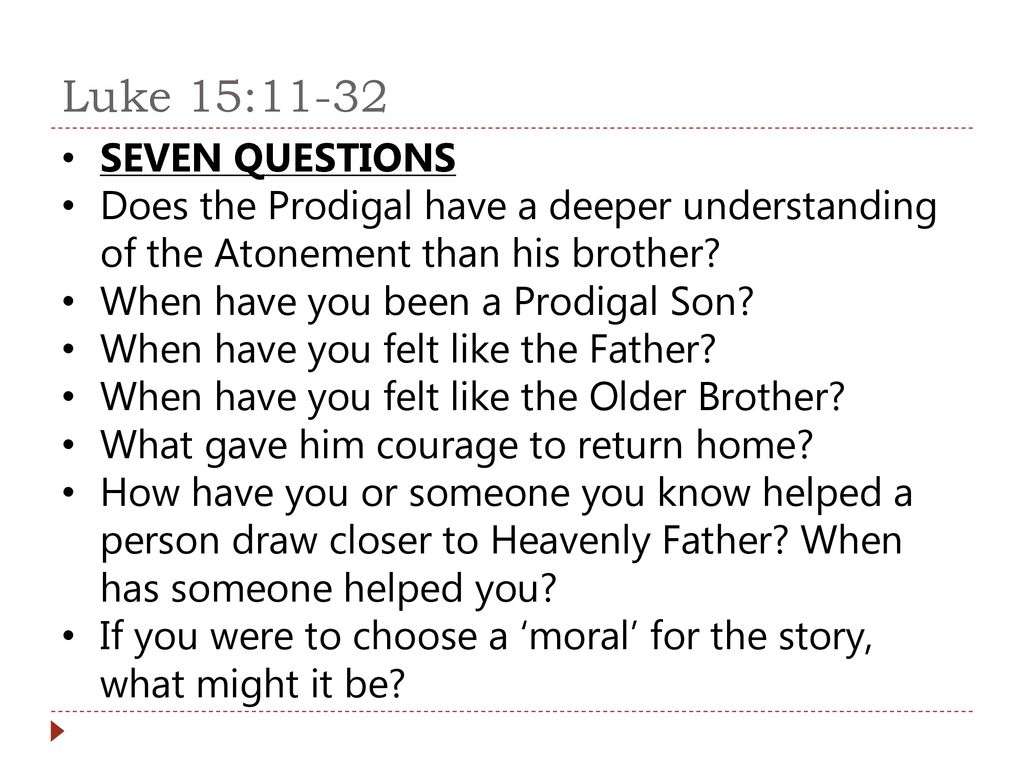Have you ever wondered about the powerful message behind the parable of the Prodigal Son in Luke 15:11-32? Dive deep into this timeless story with our Bible study questions that will enrich your understanding of forgiveness, redemption, and the boundless love of God. Join us as we explore the profound lessons hidden within this scripture passage and discover how it can transform your perspective on grace and reconciliation.
Exploring Luke 15:11-32: Deep Dive into Bible Study Questions
Sure! Here are some detailed and extensive Bible study questions for Luke 15:11-32:
1. What is the significance of the younger son asking for his share of the inheritance early?
2. How does the father’s reaction to his son’s request reflect God’s grace and forgiveness?
3. Why did the younger son squander his inheritance in reckless living, and what consequences did he face as a result?
4. In what ways does the younger son’s return home symbolize repentance and redemption?
5. How does the father’s response to the younger son’s return demonstrate unconditional love and acceptance?
6. What is the elder son’s reaction to his brother’s return, and what does it reveal about his character?
7. How does the father’s interaction with the elder son highlight the themes of jealousy and self-righteousness?
8. What lessons can we learn from the parable of the prodigal son about forgiveness, reconciliation, and the nature of God’s love?
9. How does this parable challenge us to examine our own attitudes towards those who have wronged us or strayed from the faith?
10. How can we apply the principles of this parable in our own lives to cultivate a spirit of humility, compassion, and forgiveness towards others?
Feel free to dive deeper into these questions during your Bible study or personal reflection on Luke 15:11-32.
What are the important lessons of the gospel Luke 15 11 32 )?
In Luke 15:11-32, the parable of the Prodigal Son teaches several important lessons:
1. God’s unconditional love and forgiveness: The father in the parable represents God, who eagerly welcomes back his wayward son with open arms, showing that no matter how far we may stray, God is always ready to forgive us when we repent.
2. The importance of repentance: The younger son’s realization of his wrongdoing and decision to return home symbolizes the concept of repentance, emphasizing the need for humility and acknowledging our mistakes before God.
3. The danger of self-righteousness: The elder son’s reaction to his brother’s return highlights the dangers of self-righteousness and lack of mercy towards others. It serves as a reminder that we should not judge or hold grudges against those who seek forgiveness.
4. The joy of reconciliation: The parable illustrates the joy that comes from reconciliation and restoration of relationships. Both the father and the younger son experience immense joy and celebration upon reuniting, emphasizing the importance of forgiveness and reconciliation in our lives.
Overall, the parable of the Prodigal Son conveys powerful messages about God’s love, forgiveness, repentance, humility, and the importance of reconciliation in our relationships.
What is the main theme Jesus is communicating in Luke 15 11 32?
In Luke 15:11-32, Jesus is communicating the main theme of forgiveness and redemption through the parable of the Prodigal Son. This story exemplifies God’s unconditional love and mercy towards those who repent and return to Him. It demonstrates that no matter how far we may stray or how unworthy we feel, God is always ready to welcome us back with open arms. The father’s forgiveness and acceptance of his wayward son portrays the depth of God’s love for all of His children, emphasizing the importance of repentance, humility, and reconciliation in our relationship with Him.
What questions to ask about the prodigal son?
When studying the parable of the prodigal son in the Bible, some questions to consider include:
1. What is the significance of the younger son asking for his inheritance early?
2. How does the father’s reaction to the return of his son reflect God’s love and forgiveness?
3. What lessons can be learned from the elder son’s reaction to his brother’s return?
4. How does the parable illustrate the themes of repentance and redemption?
5. In what ways does the story challenge traditional views on forgiveness and grace?
6. What role does the concept of reconciliation play in the parable?
These questions can help deepen your understanding of the prodigal son parable and its implications in the context of the Bible.
What kind of behavior pleases God the most prodigal son?
In the context of the Bible, the behavior that pleases God the most in the story of the prodigal son is repentance and humility. The prodigal son demonstrates his repentance by acknowledging his mistakes and returning to his father with a humble heart, willing to ask for forgiveness and serve as a servant. This act of humility and repentance is what pleases God the most, as it reflects a true change of heart and a desire to reconcile with Him.
FAQs
What is the significance of the parable of the prodigal son in Luke 15:11-32?
The significance of the parable of the prodigal son in Luke 15:11-32 lies in God’s unconditional love and forgiveness towards those who repent and return to Him, emphasizing the joy in heaven over a sinner who repents.
How does this passage illustrate the theme of repentance and forgiveness in the Bible?
This passage demonstrates the theme of repentance and forgiveness in the Bible through the story of the prodigal son’s return and his father’s loving and forgiving response.
What lessons can we learn from the characters portrayed in this story in Luke 15:11-32?
The story in Luke 15:11-32 teaches us about God’s unconditional love and forgiveness, the importance of repentance and humility, and the joy of reconciliation.

